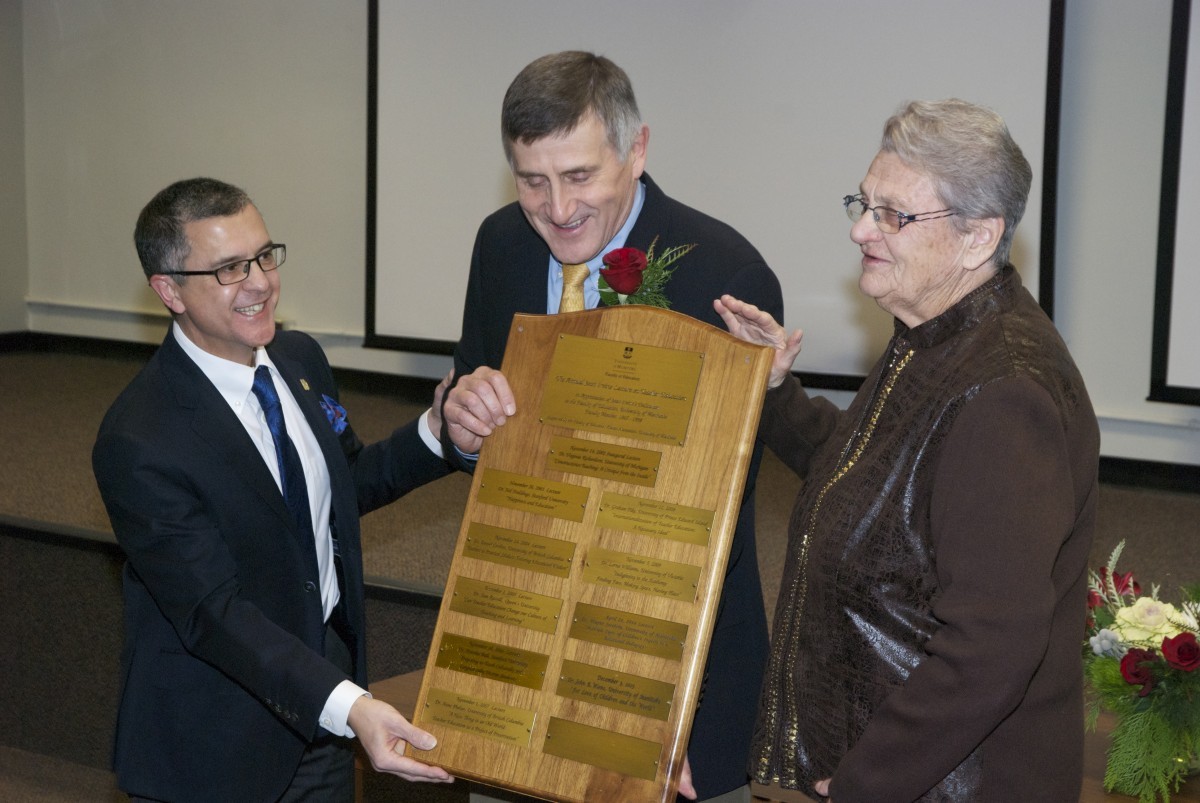
John Wiens, dean emeritus of the Faculty of Education, centre, receives the Joan Irvine Lecture plaque from dean David Mandzuk, right, and Joan Irvine, left.
Teaching children to leave the world a better place theme of Irvine Lecture
Presentation by John Wiens, dean emeritus, discusses importance of encouraging students' love of democracy, goodness, understanding
Educating children to ensure that the world is a better place than the one left by the previous generation was the theme of this year’s Joan Irvine Lecture.
The 2015 lecture, entitled “For the Love of Children and the World” was presented by John Wiens, former dean of the Faculty of Education and current dean emeritus, who is also retiring from the Faculty this month.
The idea behind Wiens’s lecture was to provide a sort of “civic sermon” in terms of his understanding of the essence of education. “It’s about how I understand, or, if you wish, it’s what I believe about our desires and dreams regarding education and teaching,” he said.
“Education, for me, is a very personal matter because it gets at our very notions of what it means to be human,” Wiens, who has been teaching for 51 years, told the audience on Dec. 3. The dean emeritus and former dean (he served in that role for a decade) has held many other high-profile posts in Manitoba education, including president of the Manitoba Teachers’ Society and head of the Manitoba Association of School Superintendents (MASS).
The annual Joan Irvine Lecture is named after the former associate dean of the Faculty and longstanding member of the faculty. The lecture is held in her honour each year and features well-known lecturers, scholars and researchers speaking about different topics in the field of education.
Wiens said his lecture was a tribute to both Irvine, with whom he taught with for many years, and political philosopher Hannah Arendt. Wiens peppered his lecture with quotes from his Arendt, who escaped the Holocaust and wrote extensively about preventing similar horrific events from happening again.
“What Hannah Arendt and Joan Irvine shared was a deep love for children, others and our common humanity.”
He spoke about several broad educational ideas, including what it is about children that demands that we educate them, why the world requires educated people and what we should teach young people.
Children, Wiens reminded the 120 or so guests who had gathered to hear him speak, are the “human equivalent of the technological ‘refresh’ function on our computers—they are our hope for refreshing our world, for making it more current, meaningful, responsive and democratic.”
“They are constant reminders that if we don’t refresh the ideas and ideals we value, they, like all our living things and our material goods, grow tired, stale and fade away.”
Adults must do their part to ensure that they introduce children to the world in such a way to encourage their love of humanity, democracy and justice, and to be accepting of diversity, he said.
And, as educators, teachers must look beyond children’s immaturity and cuteness to remember that they are endowed with the responsibility of helping children become fully formed adults and “game changers” and “the people, who, in the future, will make their and our world better—in their families, in their workplaces, in the halls of learning, of justice and power.”
Wiens said this requires discipline on the part of teachers— showing students how to first be like us and then asking them to be individually different.
The dean emeritus also touched on some of the negative aspects of teaching children that educators should remain cognizant of throughout their careers. Those include ideological scammers such as standardized testers and math fanatics, the sale of schools to the highest bidders and to remember that teachers do not cause learning—rather, young people should be taking responsibility for their own education within positive worldviews.
Teachers should strive to help students see the goodness in the world and themselves, despite the fact that it has been “messed up” by generations of adults, Wiens noted.
“Our education must emphasize achievement over failure, for it is on achievement in understanding their humanity and that of others on which they can build good lives and help others do the same—not success as measured by performance tests.”
He noted that his lecture was not meant to showcase innovative ideas in education but rather to urge educators to return to the basics of teaching children about/and with love and respect.
“The ideas I am asking us to think about are not new, never grow old in spite of their familiarity, and, as long as we hold onto them, there is hope for our humanity and for democracy.”
David Mandzuk, dean of the faculty, said that Wiens is a good reminder of “why we got into education in the first place…to work toward making this world a better place.”
A retirement celebration was also held for Wiens on Dec. 3. Click here for more.
Links to documents:







